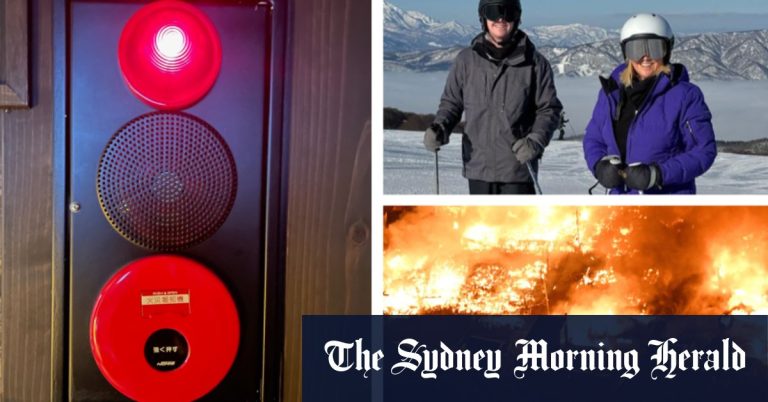Many other Australians on holiday spoke of their shock when their mobile phones, watches and other devices began emitting warning alerts before the major quake struck.
“Emergency alert. Earthquake early warning: Strong shaking expected soon. 'Stay calm and seek shelter nearby,' read the text message issued by the Japan Meteorological Agency before the 7.6-magnitude quake struck.
Sydney resident Hannah Webb, who was in the middle of a holiday with her husband and parents, said they were walking outside in Takayama, about 230 kilometers west of Tokyo, on New Year's Day when warning alerts went off in the central Japanese town of Gifu Prefecture.
“Our phones and our four watches started going off, and they were making a lot of noise,” she said.
“Within 30 seconds…the ground started shaking,” Webb said. She called it “an absolutely amazing warning system.”
Building windows rattled and cars swayed back and forth.
Two days ago, they were on the Noto Peninsula on Japan's west coast and visited the city of Wajima in Ishikawa Prefecture, which has since been destroyed by a fire caused by the quake, Webb said.
“It was really sad to see the fire that swept through Wajima because it's a beautiful city,” Webb said. “It's a special artisan and food area and multi-generational, so it's sad to see the devastation that has been done to them.”
Jane Coburn, who is traveling with her family of six from Wollongong and has been in Japan for six weeks, said a large red alarm on the wall of their room in Takayama “screamed” and text message warnings arrived five seconds before it started shaking. .
She said that “the entire building started shaking, really shaking,” accompanied by an “alarming sound,” and they took refuge in the skylight door.

Hessel Kahn and Jane Coburn (right), from Wollongong, are holidaying in Japan.
“Our room has huge old wooden beams, and we didn't want to be under them if they fell,” Coburn said. “[It] Shake for 40 seconds. I knew it had to be a big earthquake because it had been going on for so long.
She said their group conversation “lit up” because they weren't all staying in the same place, and her daughter was in the street while her son was in the bathroom.
“The hotel manager was visibly shaken,” Coburn said. His wife lived through the Fukushima earthquake and was terrified.
“We felt aftershocks, some very strong, for hours afterward. [It was a] A very disturbing and frightening experience. We now have a family earthquake plan!

A fire broke out following an earthquake in Wajima, Ishikawa Prefecture, Japan.credit: Kyodo News via AP
They were heading to the city of Kanazawa, which was initially the subject of a tsunami warning in Ishikawa Prefecture, but that warning was later downgraded, Coburn said.
His Australian colleague Michael Birch said he was in a gondola at the Nozawa Onsen ski resort, hundreds of kilometers from the epicenter, when the phones of all eight passengers “started sounding an earthquake alarm.”
“Just seconds later, the gondola pole about 10 meters in front of us began swaying from side to side, pulling the cable and our gondola with it,” he said. “We were all very afraid that the pole might fall, causing us to fall [down] the mountain.”
Brisbane social media influencer and fashion designer Nikki Parkinson, who is also holidaying at the Nozawa Onsen ski resort, was on the second floor of the chalet they shared with friends when the quake struck, while her son was taking a shower.

Brisbane influencer Nikki Parkinson (right) is on a ski holiday in Japan.credit: Instagram
She said the “extremely loud” sirens were “blasting off everyone's phones at the same time” and they had no idea how serious it was or what was going to happen.
“Things were shaking off the wall in our apartment as we were going down the stairs.”
It lasted about a minute, Parkinson said, and then they got out as power lines swayed during the tail end of the quake.
download
“We didn't really know what to do. We've been told ever since that we had to stay inside,” she said.
Parkinson said there were aftershocks over the next two hours and “her nerves were a little on edge.” She said the situation appeared normal on the slopes on Tuesday, but she was thinking about those in the hardest-hit area of Japan.
The Federal Government is “not aware of any Australian casualties at this time,” the Department of Foreign Affairs and Trade (DFAT) said in a statement on Tuesday.
“The Australian Embassy in Tokyo and the Australian Consulate General in Osaka are in close contact with local authorities to determine whether any Australians have been affected by the earthquake,” DFAT said.
“Australians requiring emergency consular assistance should contact the Australian Government's 24-hour Consular Emergency Center on +61 2 6261 3305 (from overseas) or 1300 555 135 (from within Australia).”
With Reuters
Get a direct note from our foreigners Reporters About what's making headlines around the world. Subscribe to our weekly “What in the World” newsletter..

